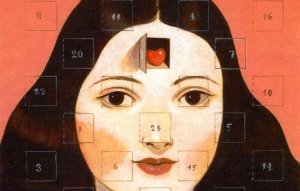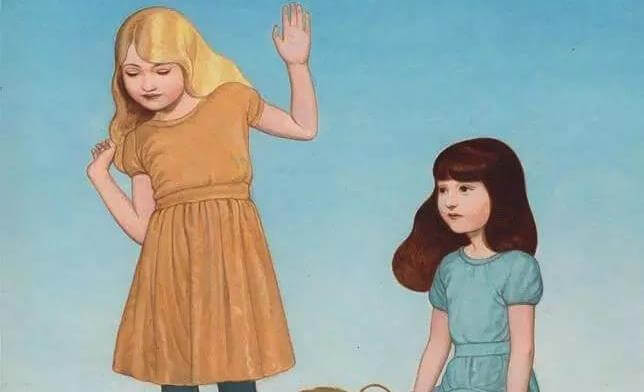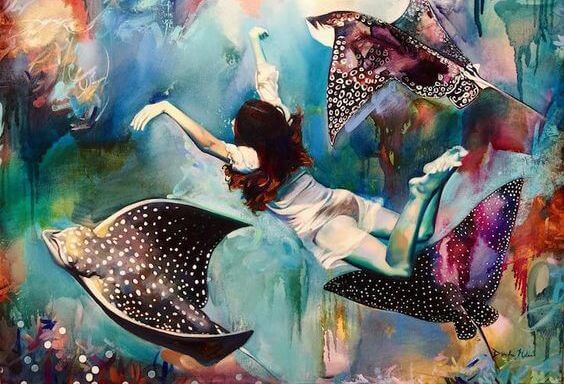Trust Is Not Needing to Know Everything

Trusting in someone is like giving the most delicate gift you could give: your heart. Trust is a precious good, a treasure to offer with caution, because it’s the most beautiful aspect of friendship and the strongest bond in a relationship. You don’t have to know everything about the person, because the connection you have with them is exceptional. Trust is necessary for intimacy to develop.
This subject goes far beyond the field of psychology. It’s an emotional force that shapes our social behavior – so much so that according to philosophy and sociology, the trust seen in humans is much more authentic and revealing than that of other animals. Other animals trust in other members of their species through simple instinctive behavior. Humans sometimes do it consciously, often using a selective filter based on experience.
“Trusting everybody is senseless, but trusting nobody is a neurotic clumsiness.”
-Juvenal-
Trust is a positive emotion that guarantees the strength of a bond. Few things define specific personality types better than the way they trust other people. A low self-esteem, traumatic childhood, or experience of betrayal can make you much more reluctant to give this gift.

Trust issues are emotionally exhausting
One of the psychological and evolutionary advantages of trust is that it allows us to temporarily suspend our instinct for self-defense, uncertainty, and fear. Few things cause more emotional distress than always being on the defensive, afraid of getting hurt or betrayed in any given situation.
Trusting someone involves removing this uncertainty in order to simplify the personal relationship. You stop viewing the other person’s behavior as a threat and start to assume that in the future, your interactions with them will be positive, that they won’t do anything to hurt you, that they’ll lend a helping hand, that they’ll always be prepared to share their light and offer you guidance.
Trust doesn’t mean you have to know everything about your partner, family member, or friend. It means you don’t need an explanation. It means that you see sincerity in their eyes, that your minds are in harmony. Between the two of you, there’s no demand, control, or constant need for reaffirmation.
Remember, the brain needs to simplify things and prefers to navigate daily routines without risk. It needs adequate emotional balance, and trust is its best weapon in this regard. When you think about it, we’ve all put ourselves on autopilot and trusted that nothing bad was going to happen.
We all trust that the doctor knows what she’s doing and will be able to help us. We all trust that when we leave home, we won’t encounter death around every corner. If we didn’t put this autopilot in command, we’d develop neurotic behavior that would completely disconnect us from reality and ruin our sense of balance.
If you want people to trust you, you have to trust them
We admit that once somebody fails you, it’s really hard to trust them again. It’s like they ripped out a piece of you, like Shylock from The Merchant of Venice charging a pound of flesh as payment. It’s a deep, permanent scar that often prevents you from getting that close to someone again.
“The best way to find out if you can trust somebody is to trust them.”
-Ernest Hemingway-
The disappointments that hurt the most are the ones that involve the people closest to you. But the worst part is that this feeling of distrust extends to other areas of your life. You stop trusting pretty much everyone until you become a permanent phobic, a ghost pushed into the most isolated corners of society by your everlasting sadness.

Trusting again is the key to vital intelligence
When some people have been betrayed, they think things like “I’ll never trust anyone again. People are hurtful, uncaring, and selfish.”
Thinking like this causes irreversible chaos in your life, whether you want it to or not. Humans are genetically and evolutionarily predisposed to connect with others. We trust to create bonds; to strengthen ourselves psychologically, intellectually, and emotionally; to develop vital intelligence.
Vital intelligence is the unconscious drive towards survival and self-actualization, where trust in ourselves and others is the most powerful source of encouragement. Because in the end, whether we want to or not, we have to open ourselves up to someone and embrace who they are, and then we’ll be able to find ourselves again.
Few things in life are more satisfying than that.
Images courtesy of Pierre Mornet
Trusting in someone is like giving the most delicate gift you could give: your heart. Trust is a precious good, a treasure to offer with caution, because it’s the most beautiful aspect of friendship and the strongest bond in a relationship. You don’t have to know everything about the person, because the connection you have with them is exceptional. Trust is necessary for intimacy to develop.
This subject goes far beyond the field of psychology. It’s an emotional force that shapes our social behavior – so much so that according to philosophy and sociology, the trust seen in humans is much more authentic and revealing than that of other animals. Other animals trust in other members of their species through simple instinctive behavior. Humans sometimes do it consciously, often using a selective filter based on experience.
“Trusting everybody is senseless, but trusting nobody is a neurotic clumsiness.”
-Juvenal-
Trust is a positive emotion that guarantees the strength of a bond. Few things define specific personality types better than the way they trust other people. A low self-esteem, traumatic childhood, or experience of betrayal can make you much more reluctant to give this gift.

Trust issues are emotionally exhausting
One of the psychological and evolutionary advantages of trust is that it allows us to temporarily suspend our instinct for self-defense, uncertainty, and fear. Few things cause more emotional distress than always being on the defensive, afraid of getting hurt or betrayed in any given situation.
Trusting someone involves removing this uncertainty in order to simplify the personal relationship. You stop viewing the other person’s behavior as a threat and start to assume that in the future, your interactions with them will be positive, that they won’t do anything to hurt you, that they’ll lend a helping hand, that they’ll always be prepared to share their light and offer you guidance.
Trust doesn’t mean you have to know everything about your partner, family member, or friend. It means you don’t need an explanation. It means that you see sincerity in their eyes, that your minds are in harmony. Between the two of you, there’s no demand, control, or constant need for reaffirmation.
Remember, the brain needs to simplify things and prefers to navigate daily routines without risk. It needs adequate emotional balance, and trust is its best weapon in this regard. When you think about it, we’ve all put ourselves on autopilot and trusted that nothing bad was going to happen.
We all trust that the doctor knows what she’s doing and will be able to help us. We all trust that when we leave home, we won’t encounter death around every corner. If we didn’t put this autopilot in command, we’d develop neurotic behavior that would completely disconnect us from reality and ruin our sense of balance.
If you want people to trust you, you have to trust them
We admit that once somebody fails you, it’s really hard to trust them again. It’s like they ripped out a piece of you, like Shylock from The Merchant of Venice charging a pound of flesh as payment. It’s a deep, permanent scar that often prevents you from getting that close to someone again.
“The best way to find out if you can trust somebody is to trust them.”
-Ernest Hemingway-
The disappointments that hurt the most are the ones that involve the people closest to you. But the worst part is that this feeling of distrust extends to other areas of your life. You stop trusting pretty much everyone until you become a permanent phobic, a ghost pushed into the most isolated corners of society by your everlasting sadness.

Trusting again is the key to vital intelligence
When some people have been betrayed, they think things like “I’ll never trust anyone again. People are hurtful, uncaring, and selfish.”
Thinking like this causes irreversible chaos in your life, whether you want it to or not. Humans are genetically and evolutionarily predisposed to connect with others. We trust to create bonds; to strengthen ourselves psychologically, intellectually, and emotionally; to develop vital intelligence.
Vital intelligence is the unconscious drive towards survival and self-actualization, where trust in ourselves and others is the most powerful source of encouragement. Because in the end, whether we want to or not, we have to open ourselves up to someone and embrace who they are, and then we’ll be able to find ourselves again.
Few things in life are more satisfying than that.
Images courtesy of Pierre Mornet
This text is provided for informational purposes only and does not replace consultation with a professional. If in doubt, consult your specialist.







